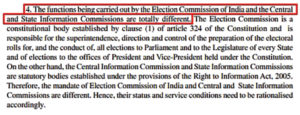Governments have always hated the RTI Act, and the recent RTI (Amendment) Bill is just one more example
Our elected representatives across the board abhor the Right to Information Act. For years, they’ve been assaulting the law with different amendments, rules and provisions to weaken it and deny information to citizens. The latest assault is happening right now in Parliament and it seems unlikely that anyone can do anything about it. But, at the very least, maybe we can talk about it!
After all, an ignorant public is a pliant public. #NewIndia.
First, to give some context on what the heck is going on, a quick recap on what the RTI does and why elected folks are scared of it. It’s a law based on this outlandish idea that gives powers to citizens to extract relevant information from the government, be it state or central government. Since we pay taxes and the governments are supposed to serve us, the idea is that we also have a right to know what they are actually doing with the money and also be able to examine the quality of work.
As per the RTI Act, a citizen can file a request for information and the relevant department of the government is mandated to provide the information within 30 days. The officer responsible for this is the Public Information Officer (PIO). If the citizen is not satisfied with the response, she can do a follow-up appeal within 30 days of getting the information with an Appellate Authority, which is the officer in charge of the concerned department. If the citizen still doesn’t get the information or is dissatisfied, there is a second appeal step. This particular appeal can be made to the Central or State Information Commission within 90 days of when the decision for the first appeal is to be made.
Mind you, this is all very time-bound and has to be done according to the law. The latest assault on the Act concerns the final step: Information Commissions (IC).
The Information Commissions, at both state and Centre, have the power to direct the government to give the relevant information, compensate the citizen for any loss and even penalise the PIO for negligence of duty. But this can only happen if the IC is utterly independent and free of any form of control from the government. That isthe case at this point of time but it is about to change.
Last week, on July 19, the government introduced a Bill titled “The Right to Information (Amendment) Bill, 2019”. This proposed law makes changes to the salaries and tenures of appointed information commissioners. The tenure right now is fixed at five years for each commissioner and the salary they get is equivalent to the Chief Election Commissioner and Election Commissioners, respectively. If this law gets passed—which it will real soon—both the salary and tenure will be decided by the central government by a simple babu-led notification.
Why are they doing this? Well, the rationale given in the Bill is this (refer to the image below).
Or, as the minister Jitender Singh put it in Parliament when introducing the Bill, “This Bill in no way compromises the autonomy of RTI, any such conception is wrong or motivated. Truth is, the Bill is enabling legislation.”
Enabling legislation, it seems. In other words, “The gormint needs to take over this otherwise wonderfully independent autonomous RTI setup, you guys. We need to make some changes to this thing.”

Simply put, the Information Commissions will no longer be independent entities which ensure the Right to Information of citizens. Instead, dear ol’ commissioners can be poked and prodded by the government, subtly threatened with dire consequences, if they don’t toe the gormint line. If they don’t listen, gormint can be like, “Off with your metaphorical official capacity head. Also, everyone gets a pay cut for being annoying!”
This is not the first-time attacks have been made to the Right to Information Act, only the latest one. Previously, the United Progressive Alliance government tried to amend and weaken the Act. Twice. Not only that, for years, the posts of Information Commissioners have been kept vacant. In five years of the Modi government’s first term, no ICs were appointed till December 2018. Then, five ICs were finally appointed last year so that people can actually appeal to real-life people. Because we still need those, you know. This happened after protests by RTI activists and some action in the courts. While this was happening, 26,000 appeals were gathering dust in the dreary CIC office.
Right now, seven months later, the number has gone up to 28,471.
The scenario is not very different in states either. Andhra Pradesh did not even have an IC for 18 months. Probably because the ex-CM Chandrababu Naidu was worried people will ask him about underwear dress code. In Maharashtra, the State Information Commission (SIC) has a backlog of more than 40,000 appeals and has four vacancies. Meanwhile, in Karnataka, there are six vacancies in the SIC which has more than 30,000 pending appeals.
So, you see, nobody who has been elected to office really likes the RTI act. They will do everything they can, dilute the law, change the way ICs are appointed, not appoint ICs for as long as possible and even intimidate RTI activists using political players. Now, with this new law, it’s just going to get to a point where the RTI Act is just a shell with a rotten core.
The Bill was cleared in the Lok Sabha on Monday and is now going to the Rajya Sabha for consideration and passing. All eyes on the upper house!
CONSTANT VIGILANCE!
www.newslaundry.com





